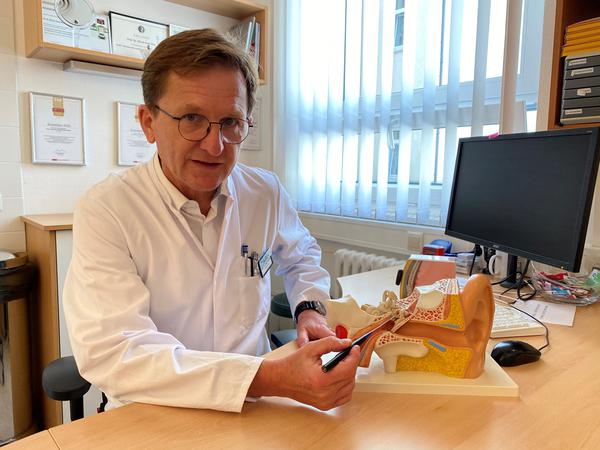Mr. Kaschke, the sound of the word “bang trauma” makes it clear that it cannot be healthy. On this New Year’s Eve, there will be a lot of loud banging again. What then happens to the hearing?
In the case of an acoustic trauma, the sound acts briefly on the eardrum and the inner ear with great violence – we physicians call this high sound pressure with high energy density. The bang of a firecracker, for example, can shake the eardrum and literally overwhelm the natural mechanisms – such as small ligaments and the ossicles – that dampen the sound and thus protect the inner ear.
The sound then hits the inner ear, which is filled with a liquid and in which the hair cells are located, almost unchecked. These normally transmit the auditory impression to the auditory nerve and thus to the brain. The bang rushes through the liquid like a tsunami, knocking over the hair cells.
How does that feel?
Since there are no pain receptors in the inner ear, you don’t feel any pain. Nevertheless, the effects are very unpleasant. Usually one has the dull impression of being deaf in the affected ear. There is also a whistling noise, a tinnitus. This is a massive stress reaction of the inner ear.

Are both ears affected?
Usually we observe that only the ear pointing in the direction of the bang is affected. However, if you come across a firecracker that is set off in a hallway or similar, both ears can also be hearing impaired for a short time.
Can the ear recover from this?
Yes, mostly. That is why doctors also speak of a temporary hearing loss in the event of an acoustic trauma. However, it can take quite a while before the hair cells straighten up again and the symptoms subside. Sometimes it gets a lot better just 30 seconds after the bang, sometimes it lasts 24 or 48 hours, sometimes even longer.
It’s not just a bang over New Year’s Eve. What happens in the ear when the first bang is followed by others?
If sound waves with high energy density repeatedly hit the hearing organ, the hair cells cannot regenerate. The improvement is thus delayed further and further. In addition, the harmful effects of the bang can add up, which means that it takes longer to regenerate or there is even no regeneration at all. Then the ENT doctor has to treat the damage.
Should you go to the doctor immediately if you have the symptoms of an acoustic trauma?
Acoustic trauma is not a medical emergency because there is no rush to start treatment as soon as possible. The time to start therapy is not critical to success. In addition, the symptoms often go away on their own. However, if there is no significant improvement after 48 hours, you should visit an ENT doctor’s office.
How can you treat an acoustic trauma?
The doctor will then usually apply cortisone. The drug is said to improve the metabolism in the inner ear and thus accelerate the recovery of the hair cells. That’s the theory. We also observe again and again that the cortisone improves the symptoms, but this effect has not yet been proven by studies. The effect is therefore only probable, but not certain, because each person reacts individually to the trauma. There is no miracle cure that eliminates the impairments with a snap of a finger.
Are there home remedies that you can use to improve the symptoms yourself?
No, there aren’t any either. But good advice: those affected should not become nervous if the symptoms do not disappear immediately. Be patient and give your hearing time to regenerate. Avoid additional noise such as loud music or the telephone. Under no circumstances should you manipulate the affected ear and do not use ear rinses. Because that could be dangerous if the eardrum is damaged.
Can the eardrum also be affected by a bang?
It depends on how hard the sound hits the ear. If a firecracker goes up in the immediate vicinity of the ear, the pressure can rupture the eardrum. Then we speak of a blast trauma. This can even cause permanent damage to the inner ear if, for example, the membrane ruptures there and the fluid surrounding the hair cells leaks out. Sometimes structures in the inner ear, such as the auditory ossicles, are then permanently damaged. This is a medical emergency and needs to be treated quickly. Otherwise there is a risk of permanent hearing damage.
Is this a common emergency?
In our ENT clinic alone, we see such severe cases caused by the New Year’s fireworks ten to 15 times in normal years. There are eight ENT departments in the Berlin hospitals, where you will have similar experiences.
So should you lock yourself up on New Year’s Eve and not go outside to protect your hearing?
That would certainly be an exaggeration. Just going for a walk or watching fireworks on New Year’s Eve is safe. It only becomes a problem when a firecracker goes off near the ear. So it’s best to keep your distance. And if you want to be near a big firecracker for a long time, you should think about a pair of earplugs for protection. They certainly won’t bother you, because then you can’t hear a conversation anyway.
To home page
